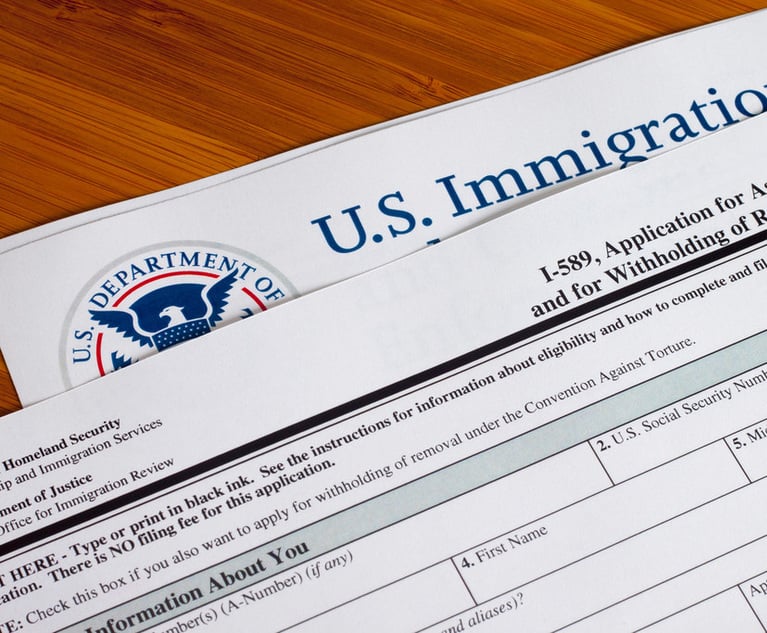Panhandler's Case Among 10 to Reach Connecticut Supreme Court in February
The Connecticut Supreme Court is set to hear oral arguments in 10 cases beginning in late February. The cases range from workers' compensation claims to criminal matters, including the sexual assault of minors.
February 05, 2020 at 06:03 PM
4 minute read
 Connecticut Supreme Court in Hartford, Photo: Wangkun Jia/Shutterstock.com
Connecticut Supreme Court in Hartford, Photo: Wangkun Jia/Shutterstock.com
The Connecticut Supreme Court is set to hear oral arguments in 10 cases during the 2019-2020 sixth session, which runs from Feb. 20-27.
Here's a look at some of the most notable cases:
John Doe #2 v. Robert Rackliffe
In litigation that centers around medical malpractice and the alleged sexual abuse of seven patients by then-pediatrician Robert Rackliffe, the Connecticut Supreme Court will decide whether the statute of limitations bars certain claims.
Connecticut law allows plaintiffs to bring claims of childhood sexual assault up until the victim turns 51. But the rub in this case is that there are both negligence claims and sex abuse claims leveled against the now-deceased doctor. And a statute of limitation bars negligence claims after three years.
The defendant estate moved for summary judgment on all of the negligence claims. But plaintiffs countered that "their negligence claims were inextricably intertwined with their sexual abuse claims, and therefore the negligence claims were timely," according to the Supreme Court synopsis of the case.
Now, the state's high court must decide whether the trial court erred in declining to apply the statute of limitations contained the Connecticut General Statutes related to negligence claims.
The plaintiffs claimed they were harmed because Rackliffe allegedly performed digital rectal examinations during their annual physical checkups. Rackliffe died in 2015 while the cases against him were pending.
State of Connecticut v. Michael J. Marsala
At issue in Marsala is whether the trial court erred in not allowing the jury to hear the charge for a lesser criminal trespass offense for Michael Marsala, who was a panhandler in the parking lots of the Connecticut Post Mall.
Marsala was convicted of first-degree criminal trespass, but his attorney maintained the jury should have been allowed to choose between that charge and the lesser charge, which would have just been an infraction for simple trespass. Court records show Marsala served four months in jail for the offense. But an infraction would have meant no jail time.
The Connecticut Appellate Court affirmed the lower court, stating that the case of Marsala, who was told panhandling in the mall parking lot was not permitted but did it anyway, didn't meet the four-prong test of State v. Whistnant. That case states that a defendant is entitled to an instruction of a lesser offense only if, among other things, there is some evidence to justify charging the lesser offense. The state says there was no such evidence.
Antonio Vitti v. City of Milford
The question in the workers' compensation case of Vitti is whether the former police officer is entitled to a permanent partial-disability award for losing his full heart—now compensated at 23%—following an organ transplant.
In 2010, while still a police officer, Vitti was diagnosed with giant cell myocarditis and underwent a heart transplant.
The trial commissioner of the Compensation Review Board issued a permanent partial-disability award to Vitti for a 23% loss of function of his transplanted heart, but rejected Vitti's claim that his native heart—and not his transplanted one—was the organ that should be considered when determining a workers' compensation award.
The state Supreme Court will decide whether Vitti is entitled to a higher award, or if the city is correct to lower the amount based on a 23% loss of function of the transplanted heart.
Related stories:
This content has been archived. It is available through our partners, LexisNexis® and Bloomberg Law.
To view this content, please continue to their sites.
Not a Lexis Subscriber?
Subscribe Now
Not a Bloomberg Law Subscriber?
Subscribe Now
NOT FOR REPRINT
© 2025 ALM Global, LLC, All Rights Reserved. Request academic re-use from www.copyright.com. All other uses, submit a request to [email protected]. For more information visit Asset & Logo Licensing.
You Might Like
View All

Trump Administration Faces Legal Challenge Over EO Impacting Federal Workers
3 minute read
Settlement Allows Spouses of U.S. Citizens to Reopen Removal Proceedings
4 minute read
Trending Stories
- 1Uber Files RICO Suit Against Plaintiff-Side Firms Alleging Fraudulent Injury Claims
- 2The Law Firm Disrupted: Scrutinizing the Elephant More Than the Mouse
- 3Inherent Diminished Value Damages Unavailable to 3rd-Party Claimants, Court Says
- 4Pa. Defense Firm Sued by Client Over Ex-Eagles Player's $43.5M Med Mal Win
- 5Losses Mount at Morris Manning, but Departing Ex-Chair Stays Bullish About His Old Firm's Future
Who Got The Work
J. Brugh Lower of Gibbons has entered an appearance for industrial equipment supplier Devco Corporation in a pending trademark infringement lawsuit. The suit, accusing the defendant of selling knock-off Graco products, was filed Dec. 18 in New Jersey District Court by Rivkin Radler on behalf of Graco Inc. and Graco Minnesota. The case, assigned to U.S. District Judge Zahid N. Quraishi, is 3:24-cv-11294, Graco Inc. et al v. Devco Corporation.
Who Got The Work
Rebecca Maller-Stein and Kent A. Yalowitz of Arnold & Porter Kaye Scholer have entered their appearances for Hanaco Venture Capital and its executives, Lior Prosor and David Frankel, in a pending securities lawsuit. The action, filed on Dec. 24 in New York Southern District Court by Zell, Aron & Co. on behalf of Goldeneye Advisors, accuses the defendants of negligently and fraudulently managing the plaintiff's $1 million investment. The case, assigned to U.S. District Judge Vernon S. Broderick, is 1:24-cv-09918, Goldeneye Advisors, LLC v. Hanaco Venture Capital, Ltd. et al.
Who Got The Work
Attorneys from A&O Shearman has stepped in as defense counsel for Toronto-Dominion Bank and other defendants in a pending securities class action. The suit, filed Dec. 11 in New York Southern District Court by Bleichmar Fonti & Auld, accuses the defendants of concealing the bank's 'pervasive' deficiencies in regards to its compliance with the Bank Secrecy Act and the quality of its anti-money laundering controls. The case, assigned to U.S. District Judge Arun Subramanian, is 1:24-cv-09445, Gonzalez v. The Toronto-Dominion Bank et al.
Who Got The Work
Crown Castle International, a Pennsylvania company providing shared communications infrastructure, has turned to Luke D. Wolf of Gordon Rees Scully Mansukhani to fend off a pending breach-of-contract lawsuit. The court action, filed Nov. 25 in Michigan Eastern District Court by Hooper Hathaway PC on behalf of The Town Residences LLC, accuses Crown Castle of failing to transfer approximately $30,000 in utility payments from T-Mobile in breach of a roof-top lease and assignment agreement. The case, assigned to U.S. District Judge Susan K. Declercq, is 2:24-cv-13131, The Town Residences LLC v. T-Mobile US, Inc. et al.
Who Got The Work
Wilfred P. Coronato and Daniel M. Schwartz of McCarter & English have stepped in as defense counsel to Electrolux Home Products Inc. in a pending product liability lawsuit. The court action, filed Nov. 26 in New York Eastern District Court by Poulos Lopiccolo PC and Nagel Rice LLP on behalf of David Stern, alleges that the defendant's refrigerators’ drawers and shelving repeatedly break and fall apart within months after purchase. The case, assigned to U.S. District Judge Joan M. Azrack, is 2:24-cv-08204, Stern v. Electrolux Home Products, Inc.
Featured Firms
Law Offices of Gary Martin Hays & Associates, P.C.
(470) 294-1674
Law Offices of Mark E. Salomone
(857) 444-6468
Smith & Hassler
(713) 739-1250










